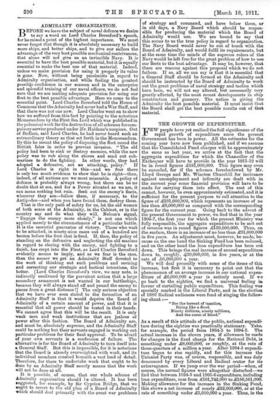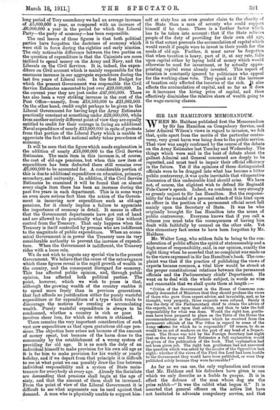THE GROWTH OP EX_PENDII1TEE.
F' people have yet realised the full significance of the rapid growth of expenditure since the present Government has been in power. All the estimates for the coming year have now been published, and if we assume that the Consolidated Fund charges will be approximately the same as last year, we arrive at the fact that the aggregate expenditure for which the Chancellor of the Exchequer will have to provide in the year 1911-12 will be in round figures £181,000,000. This figure may even be exceeded, for if the schemes foreshadowed by Mr. Lloyd George and Mr. Winston Churchill for insurance against unemployment and infirmity are dealt with in the current year some financial provision will have to be made for carrying them into effect. The cost of this cannot, however, be even approximately estimated, and it is sufficient for the present purpose to call attention to the figure of £181,000,000, which represents an increase of no less than £8,000,000 as compared with the corresponding figure for the current year. Going back to the advent of the present Government to power, we find that in the year 1906-7, the first year for which the present Ministry was fully responsible, the aggregate expenditure to be met out of revenue was in round figures £150,000,000. Thus, on the surface, there is an increase of no less than £31,000,000 in five years. An adjustment must, however, be made, be- cause on the one hand the Sinking Fund has been reduced, and on the other hand the loan expenditure has been cut down. This brings the real increase of annual expenditure down to, roughly, .30,000,000, in five years, or at the rate of £6,000,000 a year.
We will deal presently with some of the items of this increase, but first it is necessary to point out that the phenomenon of an average increase in our national expen- diture of £6,000,000 a year is entirely novel. If we go back to the eighties, we find a universal feeling in favour of curtailing public expenditure. This feeling was specially marked in the Liberal Party, and in the election of 1880 Radical audiences were fond of singing the follow- ing chant "See the torrent of taxation,
Rising like a flood.
Ninety millions, ninety millions, And the curse of blood."
As a result of this attitude of the public, national expendi- ture during the eighties was practically stationary. Take, for example, the period from 1884-5 to 1894-5. The actual increase in the eleven years, if allowance be made for changes in the fixed charge for the National Debt, is something under £8,000,000, or roughly, at the rate of three-quarters of a million a year. After 1904-5 expendi- ture began to rise rapidly, and for this increase the Unionist Party was, of course, responsible, and was duly denounced by every Liberal and Radical orator for its extravagance. If we jump over the war period—when, of course, the normal figures were altogether disturbed—we find that between 1894-5 and 1905-6 expenditure, including loan expenditure, rose from £101,742,000 to £156,561,000. Making allowance for the increase in the Sinking Fund, this shows a. net increase of nearly £52,000,000, or at the rate of something under £5,000,000 a year. Thus, in the long period of Tory ascendency we had an average increase of £5,000,000 a year, as compared with an increase of X6,000,000 a year in the period for which the Liberal Party—the party of economy—has been responsible.
The real lesson of these figures is that both political parties have forgotten the doctrines of economy which were still in force during the eighties and early nineties. The only noticeable difference between the two parties on the question of expenditure is that the Unionists are more inclined to spend money on the Army and Navy, and the Liberals on the Civil Services. It is, indeed, the expen- diture on Civil account which is mainly responsible for the enormous increase in our aggregate expenditure during the last five years of Liberal rule. In the first Budget for which the present Government was responsible the Civil Service Estimates amounted to just over £29,000,000. In the current year they are just under £47,000,000. There has also been a very striking increase in the cost of the Post Office—namely, from X16,583,000 to £21,082,000. On the other hand, credit ought perhaps to be given to the Liberal Government for having kept the Army Estimates practically constant at something under £28,000,000, while from another entirely different point of view they are equally entitled to credit for their courage in facing an additional Naval expenditure of nearly £13,000,000 in spite of protests from that portion of the Liberal Party which is unable to appreciate the fact that national safety takes precedence of economy.
It will be seen that the figure which needs explanation is the addition of nearly £18,000,000 to the Civil Service Estimates. The main item in this increase is, of course, the cost of old-age pensions, but when this new item of expenditure has been deducted there still remains over £5,000,000 to be accounted for. A considerable portion of this is due to additional expenditure on education, primary, secondary, and university. In addition, if the Civil Service Estimates be examined it will be found that on almost every single item there has been an increase during the past five years in each department. This is in some ways an even more serious fact than the action of the Govern- ment in incurring new expenditure such as old-age pensions, for it clearly implies a failure to appreciate the importance of economy in detail. It means in effect that the Government departments have got out of hand and are allowed to do practically what they like without control from the Treasury. That only happens when the Treasury is itself controlled by persons who are indifferent to the magnitude of public expenditure. When an econo- mical Government is in power the Treasury uses its very considerable authority to prevent the increase of expendi- ture. When the Government is indifferent, the Treasury rides with a loose rein.
We do not wish to impute any special vice to the present Government. We believe that the cause of the extravagance which these figures reveal is the rapid growth of wealth in the country, and the consequent disregard for economy. This has affected public opinion, and, through public opinion, has affected both political parties, The point, however, which we wish to press is that, although the growing wealth of the country enables it to spend more freely than in previous generations, that fact affords no justification either for purely wasteful expenditure or for expenditure of a type which tends to discourage the motives for creating or accumulating wealth. Purely wasteful expenditure is always to be condemned, whether a country is rich or poor. It involves sheer loss, for which no return is obtained.
There remains the very important consideration of such vast new expenditure as that upon gratuitous old-age pen- sions. The objection here arises not because of the amount of money spent, but because of the harm done to the community by the establishment of a, wrong system of providing for old age. It is as much the duty of an individual himself to make provision for his own old age as it is for him to make provision for his weekly or yearly holiday, and if we depart from that principle it is difficult to see at what point we can possibly draw the line between individual responsibility and a system of State main- tenance for everybody- at every age. Already the Socialists are demanding that pensions shall begin at the age of sixty, and that the amount of them shall be increased. From the point of view of the Liberal Government it is difficult to see what arguments can be used against that demand. A man who is physically unable to support him- self at sixty has an even greater claim to the charity of the State than a man of seventy who could support himself if he chose. There is a further factor which has to be taken into account : that if the State relieves people of the duty of providing for their own old age, it to that extent prevents the accumulation of capital which would result if people were to invest in their youth for the needs of old age. Further, it must never be forgotten that when taxation is heavy, part of it, at any rate, falls upon capital either by laying hold of money which would otherwise be used for investment, or by actually appro- priating capital sums already invested. This aspect of taxation is constantly ignored by politicians who appeal for the working-class vote. They speak as if the increase of taxation only affected the luxuries of the rich. jt also affects the accumulation of capital, and so far as it does so it increases the hiring price of capital, and thus effectively diminishes the relative share of wealth going to the wage-earning classes.











































 Previous page
Previous page